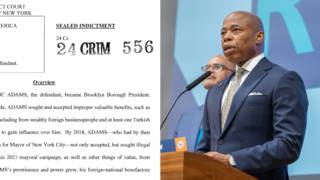
By Amy Goodman with Denis Moynihan
The cable news channels wasted no time before crowing over the landslide re-election victory of New Jersey Gov. Chris Christie. According to exit polls, Christie won a majority of both women and Latino voters, traditional Democratic voting blocs. The political chattering class is abuzz with Christie as the GOP’s great hope to retake the White House in 2016. But they miss a vital and growing undercurrent in U.S. politics: grassroots movements at the local and state level that are challenging the establishment, and winning.
Christie was expected to win, but he needed a major landslide to help him launch a 2016 presidential bid. That is where the special election came in. In June, Sen. Frank Lautenberg died at the age of 89. Christie ordered a special election to be held Oct. 16, three weeks before the general election. This decision cost the taxpayers of New Jersey an estimated $24 million in extra election costs. He could have let the voters decide the Senate race on the same day they voted for governor and everyone else, saving taxpayers millions.
Cory Booker was favored to win Lautenberg’s seat. For years, he had been the popular, African-American mayor of Newark and a rising star in the national Democratic Party. The Senate candidates would have been listed on the top of the ballot, since it was a federal office. Booker would likely have inspired a greater Democratic turnout on Election Day, and his position at the top of the ballot would likely have created a tendency for his voters to vote Democratic all the way down the ballot, hurting Christie. Without Booker on the ballot, Christie garnered a more substantial victory. When challenged about the cost, Christie boasted, “I don’t know what the cost is, and I quite frankly don’t care.”
What Christie and his party might care about are the substantial victories posted this election by progressive activists. In his own state, voters endorsed an increase in the minimum wage that Christie vetoed, raising it $1 an hour to $8.25, with annual cost-of-living increases.
Across the river in New York City, Bill de Blasio was elected mayor, the first Democratic mayor there in 20 years. “The challenges we face have been decades in the making, and the problems we set out to address will not be solved overnight,” he said in his victory speech. “But make no mistake, the people of this city have chosen a progressive path.” He supported Occupy Wall Street, got arrested protesting a hospital closure, and vows to raise city taxes on its wealthiest residents. De Blasio will start work as mayor alongside a supportive New York City Council, in what my “Democracy Now!” colleague Juan Gonzalez has called “perhaps its most progressive government in the past 50 years.”
Beyond New York and New Jersey, progressive populist movements bore fruit on Election Day. In Colorado, the state’s voters approved a plan to tax the retail sale of recreational marijuana, which was legalized statewide last November. The voters of Denver, Boulder and Littleton also approved city sales taxes on marijuana sales, further entrenching the shift from criminalizing pot to mainstreaming it. Three cities in that state also voted on banning hydraulic fracturing, or fracking. Fracking is the natural-gas drilling process that many believe pollutes groundwater and air, and even causes earthquakes.











Media Options